Intel Core i9-13900K and i5-13600K Review: Raptor Lake Brings More Bite
by Gavin Bonshor on October 20, 2022 9:00 AM ESTGaming Performance: 720p And Lower
The reason we test games in CPU reviews at lower resolutions such as 720p and below is simple; titles are more likely to be CPU bound than they are GPU bound at lower resolutions. This means there are more frames for the processor to process as opposed to the graphics card doing the majority of the heavy lifting.
There are some variances where some games will still use graphical power, but not as much CPU grunt at these smaller resolutions, and this is where we can show where CPU limitations lie in terms of gaming.
We are using DDR5 memory on the Core i9-13900K, the Core i5-13600K, the Ryzen 9 7950X, and Ryzen 5 7600X, as well as Intel's 12th Gen (Alder Lake) processors at the following settings:
- DDR5-5600B CL46 - Intel 13th Gen
- DDR5-5200 CL44 - Ryzen 7000
- DDR5-4800 (B) CL40 - Intel 12th Gen
All other CPUs such as Ryzen 5000 and 3000 were tested at the relevant JEDEC settings as per the processor's individual memory support with DDR4.
Civilization VI
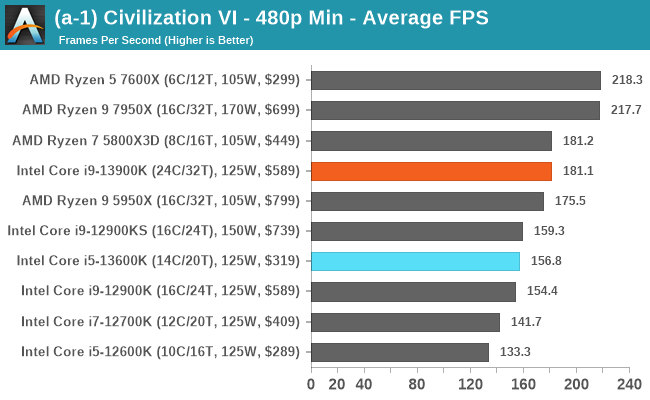
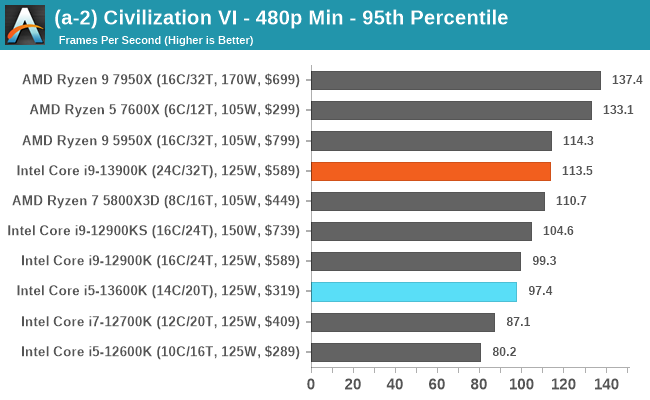
World of Tanks
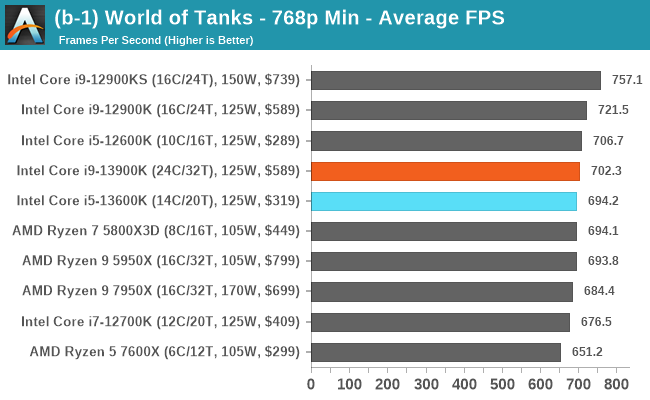
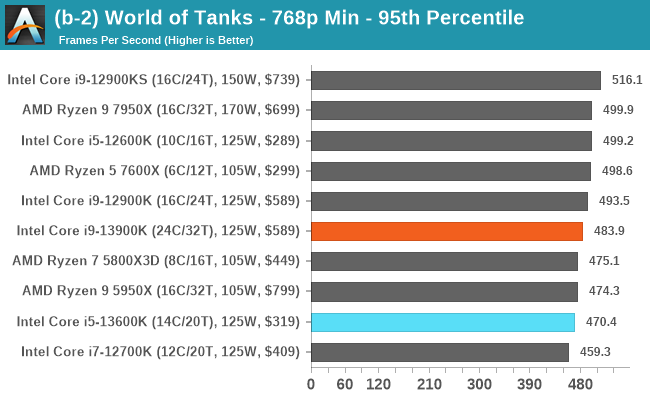
Borderlands 3
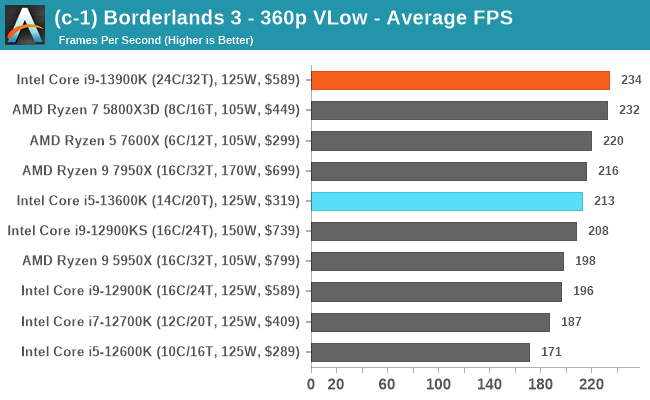
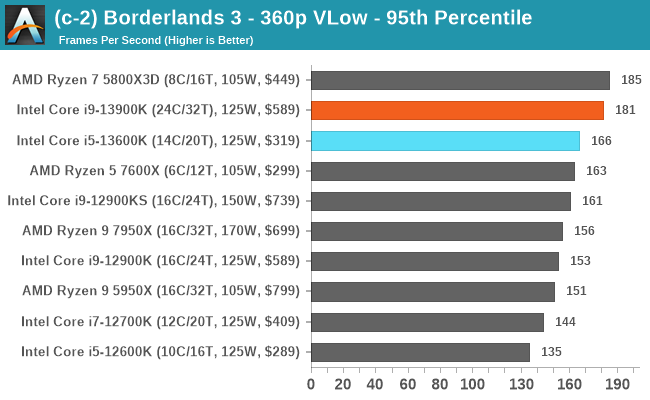
Grand Theft Auto V
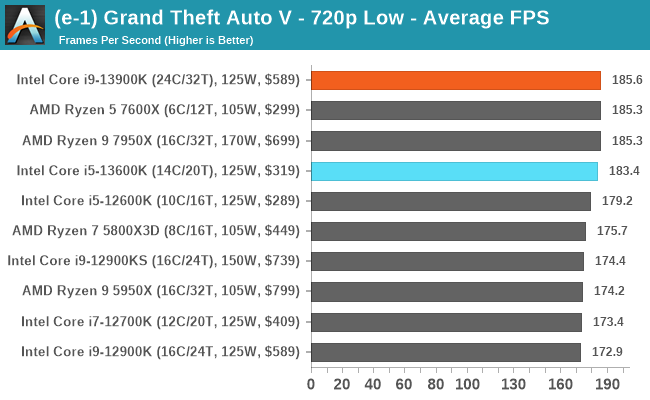
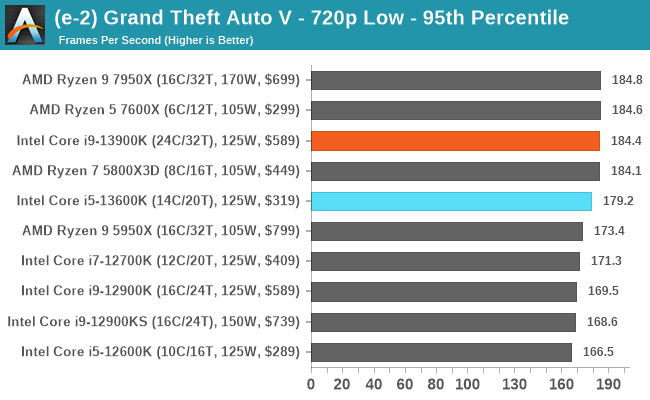
Red Dead Redemption 2
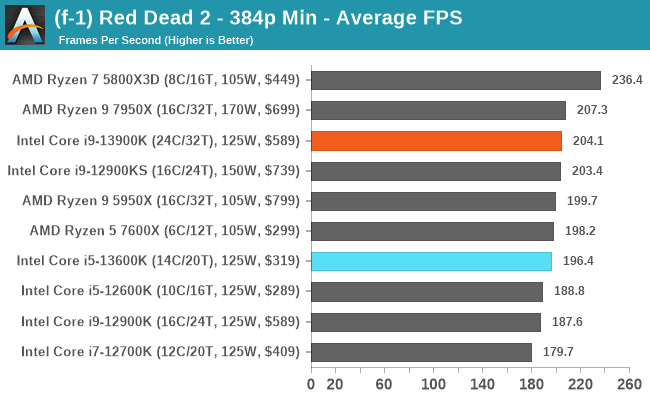
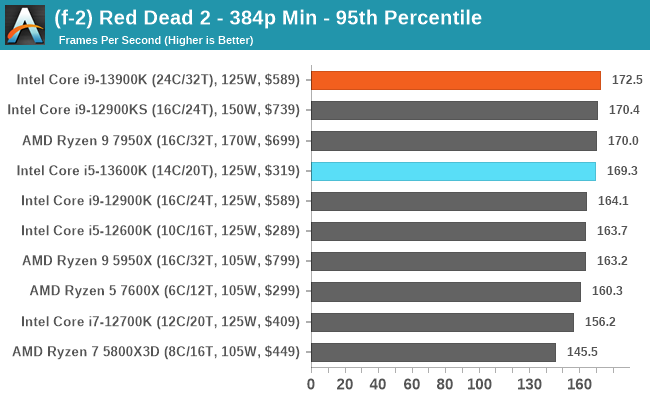
F1 2022
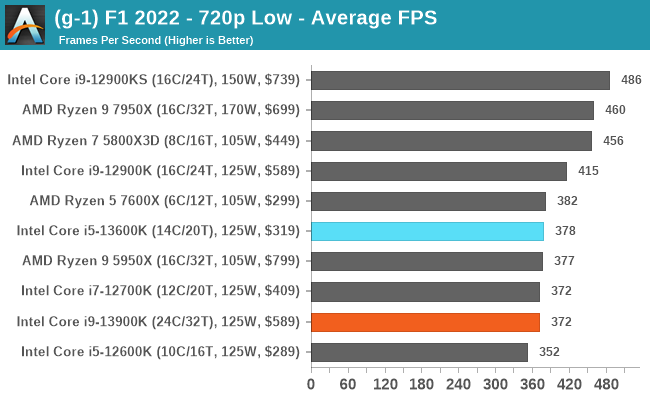
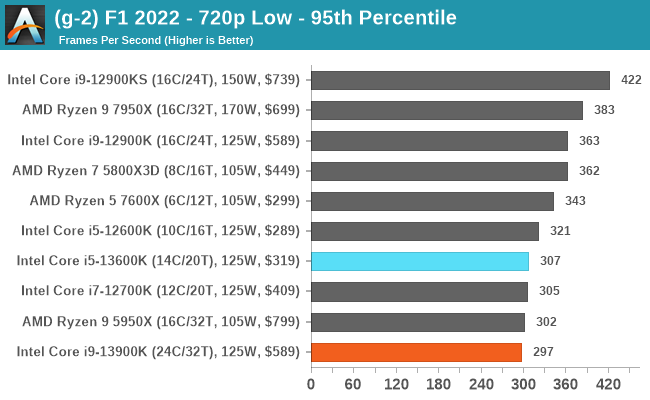
Hitman 3
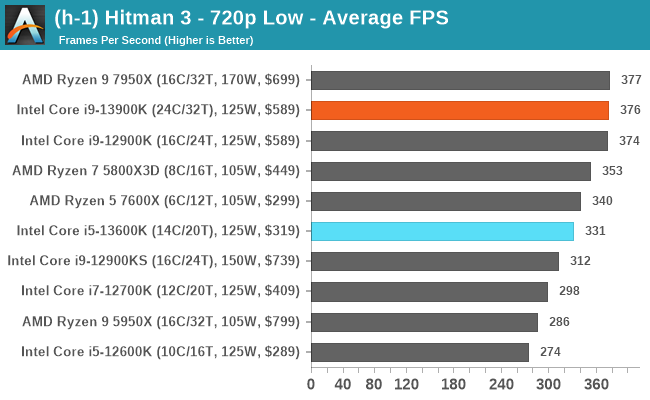
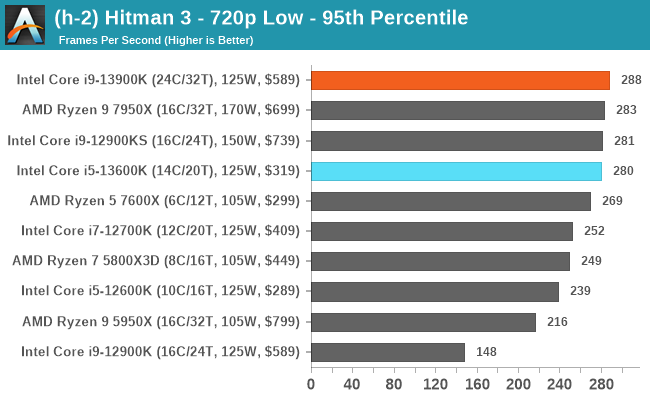
Total War: Warhammer 3
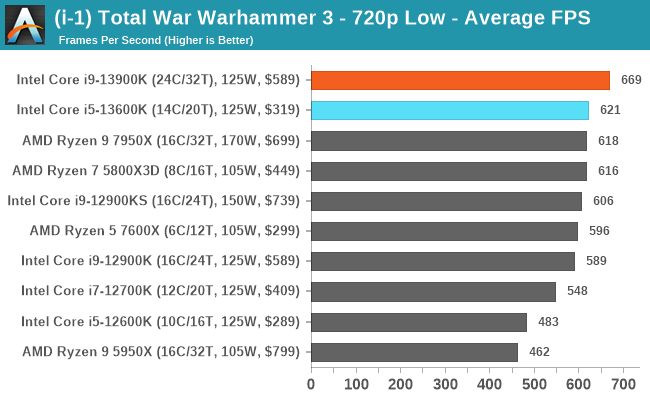
Cyberpunk 2077
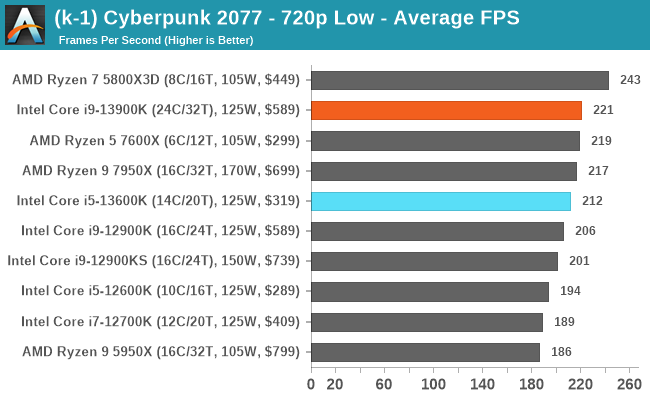
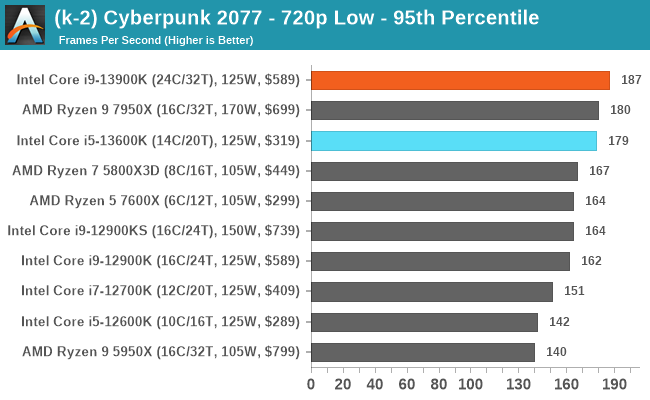
Digesting our results at 720p (and lower) resolutions, we can see that things are quite competitive at the top end, especially with the Core i9-13900K and the Core i9-12900KS across most of the games. Some of the games from our testing look to benefit from a different variable, whether that is core count, quality of cores versus core count and frequency; L3 cache size, or a mixture of all three.
In World of Tanks, the majority of the field of processors on test look to be within a certain margin depending on frequency, IPC, and core count. The Ryzen 9 7950X does well here, although the latest Raptor Lake chips seem to be hovering around the levels of performance as the previous 12th Gen Core chips. In Civ VI, the latest AMD Ryzen 7000 and their Zen 4 cores dominate the field, while the 5800X3D and R9 5950X are also competitive. Behind these come the Intel chips with the Core i9-13900K performing the best of those.
Overall, it's a bit of a mixed bag at 720/480p in terms of performance. There are cases where Raptor Lake performs well, but equally, the same can be said for the Ryzen 7000 chips. But ultimately, none of the top chips here have a 95th percentile frame rate lower than 170fps in any action game, while the more unique Civlization 6 never drops 114fps. Which is to say that these high-end CPUs aren't likely to be a gaming performance bottleneck any time soon – getting a GPU that can keep up at higher resolutions is going to be the harder task.










169 Comments
View All Comments
Castillan - Thursday, October 20, 2022 - link
It never ceases to amaze me how Intel gets away with marketing a 330W+ CPU as a 125W CPU ReplyHulk - Thursday, October 20, 2022 - link
It's kind of like how you can drive a car rated at 32mpg EPA mileage and have it return 18mpg. Replyboozed - Thursday, October 20, 2022 - link
It's probably more like the modern turbocharged cars in which no real driver can reach the quoted fuel consumption because the manufacturer cheesed the economy testing. Replyabhaxus - Saturday, October 22, 2022 - link
Dunno what you mean, I regularly exceed the rated fuel economy for my car (twin turbo V8) as well as rental cars with turbo engines. All it takes is only going on boost when you actually want to go fast. Replyboozed - Saturday, October 22, 2022 - link
One of the car magazines in Australia consistently had trouble with small European turbo engines using up to twice as much as quoted even when not being pushed hard. BMW was the worst offender. Replymaxijazz - Friday, November 4, 2022 - link
Define "not being pushed hard". ReplyYojimbo - Thursday, October 20, 2022 - link
TDP has a technical meaning and Intel (and AMD, because they do they dame thing) are using it properly.Intel is even moving away from calling it "TDP" because of consumer, and hardware review sites/channels, misunderstanding of the term.
In order to understand the situation, go search the anandtech article where Ian Cutress actually suggests Intel do exactly what it is doing to cut down on confusion. Reply
yh125d - Thursday, October 20, 2022 - link
It has a technical meaning, but that meaning is not important to consumers/enthusiasts using the machine. It's misleading at best ReplyYojimbo - Thursday, October 20, 2022 - link
it's not misleading at all. people are just uneducated. Replyyh125d - Thursday, October 20, 2022 - link
That's absolutely asinine and completely incorrect. 125w TDP can lead people to think that the processor uses around 125w, or is limited to 125w, or that they should plan on cooling around 125w, that they should plan for a PSU load in the 125w range, or that the performance quoted by Intel is produced at around 125w. Because that's what Intel says TDP means. None of these are even a little bit correct. It is entirely misleading, and a completely useless number for consumers. Since AMD's TDP is more accurate (though still off) compared to Intel's, you can't even count on it to indicate which processor might use more power than another. 7950X @ 170w TDP uses less power than 13900k @ 125W TDP in all casesFrom Intel directly: "TDP stands for Thermal Design Power, in watts, and refers to the power consumption under the maximum theoretical load. Power consumption is less than TDP under lower loads. The TDP is the maximum power that one should be designing the system for. This ensures operation to published specs under the maximum theoretical workload."
By intel's own definition, TDP means exactly what people would expect it to mean, however it is a completely inaccurate number, as Anandtech and others' testing clearly shows. You can act like a knowitall all you want and claim others are just uneducated, but all that does is expose your own ignorance of the situation here. Reply